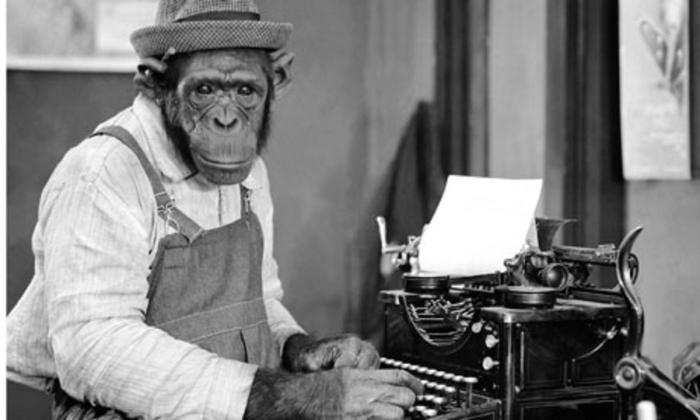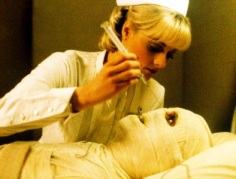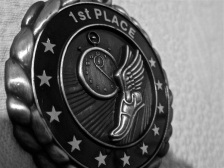As in the past, let me preface this by stating I don’t care what your brother-in-law says is correct, I don’t care what you saw in the Huffington Post, and I don’t care what you found on grammarly.com or some other online resource. I care about these three things in order of significance:
- What I’ve learned, used, and remembered throughout my formal education from kindergarten through 12th grade and then through my eight years of higher education at two different universities.
- What I’ve reinforced and taught while teaching English and writing going back to 1987.
- What I know is “better” as compared to “acceptable.” For example, “isn’t” is better even though many people find “ain’t” to be acceptable. Better is always better.
Please don’t waste my time with random online dictionaries or blog posts by idiots like me, unless it actually is a post by me. If it’s by anyone who disagrees with me, it’s wrong.
Here’s another argument I don’t accept: You can’t use the same word all the time. You need variety.
You would be right, except – no. Variety is not always better, especially in the examples listed below. That’s all there is to it. Now let’s do some learnin’.
Woman v. Female
“Doctor warns women athletes on concussion dangers”
“Female doctor poisons coffee of lover”
What’s the difference here? The difference is that female is an adjective and woman/women is a noun. Would you write this headline using “man” instead of “male”? If so, you’re an idiot. Far too often I see headlines using “woman” or “women” as if they are completely interchangeable with “female.” The words are obviously related, but they’re not synonyms. Sorry.
Know v. Believe, Think, Feel…
“That’s when I knew I was going to die.”
No. No you didn’t. You didn’t know because you didn’t die. Too often I read books in which something devastating seems about to happen and the narrator or character says, “I knew I was going to die.” If you’re writing in past tense, and if you didn’t die, then you didn’t “know” you were going to die. Plain and simple.
However, you can write any of the following:
I believed I was going to die.
I was sure I was going to die.
I was convinced I was going to die.
I felt like I was going to die.
I read a Jodi Piccoult novel (not good) in which the narrator wrote that a mother “knew she would never see him again.” The mother was thinking about her son who was facing life in prison for murder. Turns out the kid was not guilty, and turns out she did see him again. So, also turns out that Ms. Piccoult, or her narrator, goofed. That’s not acceptable.
A Historic v. An Historic
I was watching Erin Burnett on CNN one night when she referred to something as being “an historic occasion.” I’ve also heard Bush 43 say this, and I’m sure hundreds of others. They’re all wrong. I’ll explain.
First, let’s understand the difference between a vowel and a consonant.
Consonant: a speech sound (such as /p/, /d/, or /s/) that is made by partly or completely stopping the flow of air breathed out from the mouth
Vowel: a speech sound made with your mouth open and your tongue in the middle of your mouth not touching your teeth, lips, etc.
To say “an historic” means to treat /h/ as if it were a vowel. Do me a favor, pronounce the word “historic.” Now, tell me if your tongue is “in the middle of your mouth not touching your teeth, lips, etc.” I think you’ll find that your tongue actually spreads wide and touches your back, upper teeth. Therefore, is the /h/ in “historic” a vowel or a consonant? Right! It’s a consonant. To continue, do we precede initial consonant sounds with “a” or “an”? Right again!
Remember, we’re talking about the /h/ in “historic,” not all words that begin with /h/. For example, the /h/ in “hollow” seems to be closer to a vowel than a consonant. It’s the /i/ that follows the /h/ in “historic” that forces the tongue to touch the teeth.
You can argue that using “a” or “an” before an “h” should be taken on a case-by-case basis, but you can’t argue that “an historic” is correct.
First v. Firstly
I often get Tweets from writers who have written blog posts about writing. Most of them begin with something like “Five Common Misused Phrases” which is a disguised way of saying “Five Reasons I’m a Better Writer Than You.”
I recently but briefly battled with a writer who started his list with “Firstly.” Right there, I stopped. I scanned and saw “Secondly” and “Thirdly” and then I was done, except for the comment that he didn’t like to such a degree he called me an a$$hole. There are plenty of reasons to call me that, but my challenge of your writing is not one of them.
When you write a list, something must be first, second, third, and so forth. When you run a race, someone finishes first, second, third, and so forth. Nobody in the Olympics or anywhere else ever listed the finishers of a race as “firstly” or “secondly” or anything else.
Perhaps “Firstly” was created with a semi-good intention. Someone noticed that when you list something as being “First,” it’s actually an adverb. Adverbs tell you how, when, where, and to what degree something happened. “First,” tells you when – first, second, third, etc. Unfortunately, many adverbs also end with “ly.” It’s likely that’s the reason the creator of “firstly” added the –ly. This is only a theory at this point, but it makes sense. “Firstly” goes back to Great Britain in the 1500’s. Though it may have been used in an acceptable way back then, it wouldn’t be the first (not “firstly”) word that history has or should have deleted.
Please remember something very important – I don’t care about what websites you might use that tell you “firstly” is acceptable. I only care which is better or more strongly correct. I only care about which will never be argued or contested. Nobody will ever tell you that using “first” might be wrong, but many people will tell you that “firstly” is wrong. How is it better to choose something that can be argued against instead of something that is 100% correct?
Have a nice day.








What about secondly? Maybe I just hear it all the time.
i actually found an article that said it’s correct to write “first” then “secondly, thirdly, etc.” that makes no sense to me.
Now we see why we have firstly. 🙂 Firstly doesn’t really sound right to me. It sounds kind of cute though, doesn’t it?
it sounds like a kid trying to say “thirsty”
That it does!
I love the attitude. Makes me smile. I used to read someone who uses “thusly” regularly. I couldn’t take it any longer. Or any more. Or whatever is better because now I’m not sure, but I know “thusly” isn’t something I want to read.
“thus” is good enough, although that word sounds a little snooty at times. thanks for sharing your thoughts.
I don’t think I agree with you on the usage of “know”. If you expect something to be true with near absolute degree of certainty, you can say “I knew” whether or not you turn out to be correct. For example, you’d say you “know” you parked your car in the garage. You probably wouldn’t have used “feel”, “think”, or “believe” in this case. But if you would have then checked the garage and found that the car was gone, the car’s absence wouldn’t retroactively change the level of certainty about the car being in the garage that you had just before you looked inside the garage.
Similarly, if I fall out of an airplane 30,000 feet in the air, “I knew I was about to die” would be appropriate because death would be almost guaranteed in this case.
to me, you can’t use “know” unless it’s indisputable, a fact that can’t be argued. that’s why we have words like ‘believed” or “was convinced” or “had no doubt.” there’s probably your best choice – to say “i had no doubt.” you can have no doubt but still be wrong, and that’s the essence of my point. if you “know,” then you shouldn’t be wrong. but it’s a worthwhile debate. thanks for adding to it.
I think that even if you use “know” according to the definition ( http://www.oxforddictionaries.com/us/definition/american_english/know), it doesn’t preclude being occasionally wrong about something that you “know”.
in most cases i’m all about the “best” dictionary definition. however, in this case – and i should have included this in the post – it’s not so much the definition as it is about the connotation in the reader’s head. when i’m reading fiction and someone says they “know” something, it connotes that there is no question, no doubt, and it’s a fact. thanks for showing me where i need to edit the post and add a little more explanation.
Firstly, I started laughing at “If it’s by anyone who disagrees with me, it’s wrong” and just kept smiling. Secondly, I never thought much about the woman/female usage, so to me, that was the most interesting. Thirdly…well, I guess that’s it. Enjoyed it as always and enjoy July Fourthly.
janet
now that i think about it, few people other than you might “know” there’s a little tongue in cheek there. and i can “believe” that even you might not be certain of that. have a great, happy, flag-waving day. i’ll be driving in a car in a smalltown july 4th parade.
How did you know what my tongue was doing when I was saying “historic?” Are you in my mouth?
My evil twin obviously hacked into my wordpress account!
I’m so glad someone else gets the women/female thing. I hate it how they talk about “women bishops”. They don’t talk about “men bishops”… It’s been like fingernails on a blackboard for me for the last few years while the CofE has been debating the issue!
i’m glad this isn’t just my issue. thanks for chiming in.
I agree with all you said. I like looking at your examples to see if I can figure out what’s wrong before I read your commentary. Can’t help it. I’m a grammar geek, too. “An” before an “h” [in a word beginning, not just the letter] always drives me crazy. Never, ever liked “firstly,” etc. Just say it first or use another introductory word. Thanks for these grammar posts!
thanks to you for stopping by and noticing and sharing your thoughts.
Great info. I’m surprised you caught the EB’s verbage. I find the H-thing to be difficult for me, but I would have written what EB said. FYI reminder: My story goes live soon.
i’m on it today. thanks for the reminder. i’m not as good with prompts as i used to be, but i have an angle.
With you, I’ve learned to expect the unexpected.
i like the sound of that. i hope it’s okay that i put my link in your comments. if that’s not the best way to present it, feel free to restructure or ask me to restructure as you see fit.
Inserting the links into the comments was fine … and I hope others come over … and I’ll try to remember to stop by for comments.
Hey, Brainsnorts,
My brain, snorty or not, tends to work like yours. I know that because I often find myself parsing and editing the syntax, style and grammar of stuff I read. Perhaps that’s why I felt a little tingle when I found a small error in your assertions. Aha. The word female can properly be a noun. But then, your guidance (assertion?) is still good because of usage. Usage is also a good reason, in my opinion, for using “an” before a word beginning with “h”. That’s not only what I learned, back in the day, but I find it easier to pronounce. As for “ain’t”, I occasionally find it, like other slang, useful to express sarcasm. Ain’t it the truth? 🙂
Jim
i don’t think i was complaining about female being used as a noun as much as i was having a problem with woman being used as an adjective. but i’ll have to re-read it to be sure.
as for the “h” with either “a” or “an” preceding, it is all about whether the “h” sound is actually a consonant or a vowel. sometimes the things we learned “back in the day” were not actually correct. i once had a science teacher tell me that you’ll never see the sun and moon in the sky at the same time. completely absurd.
the real problem, when it comes to language and usage, is the “acceptable” part. some things have been used so often by enough people that dictionaries and other authorities are tired of fighting the good fight, if you wan to call it that. they’re putting up their hands and just accepting what is not correct. it’s a shame. as nixon said, when you accept lower standards, you better expect lower results.
Your blogs are quite insightful. To those of us that speak fairly well, we hear those that are far below par, yet we are better does not mean we do not make mistakes. At times I think many of us, myself included have to go back and educate ourselves again from time to time.